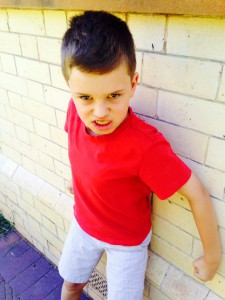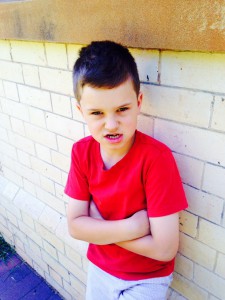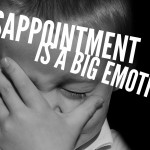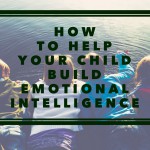 Anger is a normal emotion to go through, especially as a child and especially boys aged about 7 or 8. But when you are a child or a parent watching your child lash out when they are angry – it can be hard for everyone involved.
Anger is a normal emotion to go through, especially as a child and especially boys aged about 7 or 8. But when you are a child or a parent watching your child lash out when they are angry – it can be hard for everyone involved.
Children share the same emotions as adults but do not know how to control their anger. They need direction and some need it much more than others. Angry outbursts are OK if they are not physically hurting you or any other person – if this happens, it is probably time to seek professional help.
Here are some tips to help your child deal with their anger.
1. Remain calm
Anger is a big emotion. It is big for us as well as our children and it might take all your energy to do remain calm, but if you can during your child’s angry outburst, it is worth it. Once they have ‘flipped their lid’, there is nothing you can do so it is best to stop talking, make sure there is no danger and ride out the storm. Once they have finished the outburst – it is then time to teach them about emotions.
I have three children and so I know it is not possible as a parent to remain calm ALL of the time. I always say to my kids if we do things MOST of the time – then we are doing well. I know if I am tired and had a big week and my children are then angry, I will probably be angry back and it takes a whole lot longer for us all to get over it. But if I am the adult, stay calm and ride it out – it is over more quickly and we are all hugging again in no time.
2. Teach your child emotional intelligence
Teaching your child to react to emotions is probably the most important skill you can teach your children. There are many ways to do this. This is the method I use for the children I teach at school, for my own children and I have shared it with many mums.
You can not use this during angry outbursts, only some time after when it has all calmed down. Possibly in your quiet time with your child.
Draw up a table with 3 columns. In the first column, workshop with your child the ‘red’ emotions. That is all the emotions that make your child feel ‘bad’. For example, sad, upset, angry, disappointed, tired, worried ect.
In the second column workshop ‘green’ emotions or the things that make your child feel ‘good’. For example, happy, energized, pleased, loved ect.
In the last column, list 5 things your child can do to move their emotions from the ‘red’ column to the ‘green’ column. This might be things like – read a book with mummy, play the computer for 10 minutes, go for a walk around the block with the dog, play lego on my own, have a bath, go to the park.
Then when your child is angry, you can refer to their Red/Green chart. Get them to tell you what red feeling they have right now. Get them to tell you which green feeling they want right now. Ask them how they are going to get from the red to the green.
Ideally, this will help your child self regulate their own emotions. Especially something as big as anger. This whole process will take time and probably a lot of it – but it is worth it.
3. Be a role model
Children are like sponges and watch everything you do. If you yell and kick things when you are angry – it is almost guaranteed they will. If they see you loose your cool and not deal with it in a way you want them to, they will copy. If you are angry and you talk through it – tell your kids you are angry because of (what ever it is) and you are going to deal with it by walking around the block – they will know that it is normal to be angry and put their own strategies in place to deal with it.
This also ties into Tip 1. If I am calm when my child is angry, I am being the adult in the situation and not loosing my cool. If I do, then they see it is fine to do because I am the role model.
4. Know your child’s emotional intelligence and react accordingly
As a mum, we know our children the best. We know what sets them off and while we can not avoid it every time – try not to put them in a situation where you know they will be angry. My son is terrible when he goes to bed late. Last week, we were away and he went to bed after 9pm three night running. By the fourth day, he was tired and cranky and the smallest things set him off. I knew he was tired so on the fourth night, I put him to bed at 7.30pm – there was some resistance as we were staying at his cousins place and they were all still up. But I knew him and I knew his limits of being tired and acted accordingly.
It is important for you to respond to the needs of your child in this situation and know what their triggers are. Another trigger for us is the last day of the school holidays. We have spent enough time together and everyone is ready to get back to their routines – and so there is often angry outbursts. I know they will happen and I am prepared for what will ensue.
5. Reassure your child
Anger is a big emotion and children are often scared by it. They react without thinking and during or after an angry outburst they can feel embarrassed and upset. You need to reassure them that being angry is OK and turn it into a lesson. Remind them from Step 3 of what they can do to stop feeling angry.
6. Be consistent
If your child is having angry outbursts, you need to be consistent and start as you mean to go on. So, if your child is having an angry outburst and you can stop it with a cuddle – do it. If they don’t want to be touched, maybe you need to walk away or speak to them in a calm voice. If you loose your cool once, then cuddle them the next time, then yell the next time, then walk away the next time – you can see how this will give the wrong message. As their mum, you will know the best way to reassure your child and then be consistent with it.
These six tips will help with other emotions as well. You can use them with any of the ‘red’ emotions.
Kids are often angry when they get in the car from school and I saw this piece from Early childhood advocate, parent educator and author, Maggie Dent. Watch it here. It describes the pressure cooker that school is and the safety net the car is. I couldn’t agree with her more! My almost 8-year-old boy is right at this stage now – he is a complete angel at school and when he gets in the car, he looses it. But that is OK. I am his safe haven and happy to be that.
What do you do when your child gets angry?
Want more? Follow Anna Partridge on Facebook, Twitter or Instragram.
Sign up to the weekly BombardedMum newsletter here.
About the Author: Anna Partridge
 Anna Partridge is mum to three beautiful, highly spirited children aged 9, 8 and 5. She created BombardedMum to share inspirations and joys about raising the next generation and to allow mums to think about the ‘big picture’ of parenting and instilling the right habits, values and beliefs in their children from the start.
Anna Partridge is mum to three beautiful, highly spirited children aged 9, 8 and 5. She created BombardedMum to share inspirations and joys about raising the next generation and to allow mums to think about the ‘big picture’ of parenting and instilling the right habits, values and beliefs in their children from the start.
Anna is a Parent Educator, holds a Bachelor of Education (Primary), a Bachelor of Communications and is a freelance parenting writer. She is privileged to work alongside families to create calm and balance, help raise confident and resilience kids and maintain strong and connected relationships. Anna offers private parenting and family coaching at www.annapartridge.com.







Some really great tips. My 3-year-old gets really angry already and I’m struggling to help her deal with it. I’ve always had a bad temper myself and struggled with my own anger, so it’s hard in many ways to be a good role model and also help my daughter.
Christine – thanks for being so honest. Our children are often our greatest teachers and while I too can get angry, knowing I am the role model for my kids helps me to pull back. When I do get angry, I tell my kids why I am angry and show them how I can bounce back from it or the tools I use to bring myself out of the angry outbursts – it is a learning experience for all of us.
Some great tips here. My 5yo daughter can get quite angry and emotional. I try to remember to breathe and stay calm myself during these times to help her through these moments with a little more clarity. Whether it be a chat, a hug or whatever is needed. If we’re both angry these episodes last a lot longer.
@Erika – thanks for sharing. Have you seen the hand analogy of the brain and flipping the lid? This can be helpful for both of you to understand that when the lid flips there is no point continuing on as you said – if you are both angry it lasts longer. My eldest daughter knows how to press my buttons and it took me 7 years to work out I was flipping my lid and this was just making the situation worse. We both still get angry at times but the flame has been taken out.
Great tips. My child is only 2 and gets sulky instead of angry… So far! It’s tough for the little people to know how to express themselves and takes a lot of patience.
Yes!! Completely agree it takes ALOT of patience @Holly – my grandpa said to me once, “Patience is a virtue of which you do not have!”. I have learnt to be patient with my kids but at times it takes my entire self to preserve the patience. Thanks for sharing.
I always tell myself the fact that I’m a psychologist (who recently started working with kids) means I should be awesome at it, but we all have those moments. Like when the 2 year old keeps jumping all over me while pregnant… Grrrrr haha
@Holly I am exactly the same! I am a school teacher and parent educator and I certainly don’t have all the answers with my kids! I do love it that we are also on the journey to being a better parent with everyone else – there is something real about it and creates empathy. Congratulations on being a psychologist working with kids – so valuable.